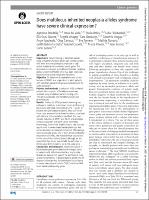| dc.contributor | Vall d'Hebron Barcelona Hospital Campus |
| dc.contributor.author | Stradella, Agostina |
| dc.contributor.author | Feliubadaló, Lídia |
| dc.contributor.author | Grau Garces, Èlia |
| dc.contributor.author | Velasco, Àngela |
| dc.contributor.author | Balmaña Gelpí, Judith |
| dc.contributor.author | Rofes, Paula |
| dc.contributor.author | del Valle, Jesús |
| dc.date.accessioned | 2021-04-08T10:53:28Z |
| dc.date.available | 2021-04-08T10:53:28Z |
| dc.date.issued | 2019-08 |
| dc.identifier.citation | Stradella A, del Valle J, Rofes P, Feliubadaló L, Grau Garces E, Velasco A, et al. Does multilocus inherited neoplasia alleles syndrome have severe clinical expression? J Med Genet. 2019 Aug;56(8):521–5. |
| dc.identifier.issn | 1468-6244 |
| dc.identifier.uri | https://hdl.handle.net/11351/5830 |
| dc.description | Cancer syndromes; Gene panel; Genetic testing |
| dc.description.abstract | Importance Genetic testing of hereditary cancer using comprehensive gene panels can identify patients with more than one pathogenic mutation in high and/or moderate-risk-associated cancer genes. This phenomenon is known as multilocus inherited neoplasia alleles syndrome (MINAS), which has been potentially linked to more severe clinical manifestations.
Objective To determine the prevalence and clinical features of MINAS in a large cohort of adult patients with hereditary cancer homogeneously tested with the same gene panel.
Patients and methods A cohort of 1023 unrelated patients with suspicion of hereditary cancer was screened using a validated panel including up to 135 genes associated with hereditary cancer and phakomatoses.
Results Thirteen (1.37%) patients harbouring two pathogenic mutations in dominant cancer-predisposing genes were identified, representing 5.7% (13/226) of patients with pathogenic mutations. Most (10/13) of these cases presented clinical manifestations associated with only one of the mutations identified. One case showed mutations in MEN1 and MLH1 and developed tumours associated with both cancer syndromes. Interestingly, three of the double mutants had a young age of onset or severe breast cancer phenotype and carried mutations in moderate to low-risk DNA damage repair-associated genes; two of them presented biallelic inactivation of CHEK2. We included these two patients for the sake of their clinical interest although we are aware that they do not exactly fulfil the definition of MINAS since both mutations are in the same gene.
Conclusions and relevance Genetic analysis of a broad cancer gene panel identified the largest series of patients with MINAS described in a single study. Overall, our data do not support the existence of more severe manifestations in double mutants at the time of diagnosis although they do confirm previous evidence of severe phenotype in biallelic CHEK2 and other DNA repair cancer-predisposing genes. |
| dc.language.iso | eng |
| dc.publisher | BMJ Publishing Group |
| dc.relation.ispartofseries | Journal of Medical Genetics;56(8) |
| dc.rights | Attribution-NonCommercial 4.0 International |
| dc.rights.uri | http://creativecommons.org/licenses/by-nc/4.0/ |
| dc.source | Scientia |
| dc.subject | Gens del càncer |
| dc.subject | Càncer - Prognosi |
| dc.subject.mesh | Neoplasms |
| dc.subject.mesh | Inheritance Patterns |
| dc.title | Does multilocus inherited neoplasia alleles syndrome have severe clinical expression? |
| dc.type | info:eu-repo/semantics/article |
| dc.identifier.doi | 10.1136/jmedgenet-2018-105700 |
| dc.subject.decs | neoplasias |
| dc.subject.decs | patrones de herencia |
| dc.relation.publishversion | https://jmg.bmj.com/content/56/8/521.long |
| dc.type.version | info:eu-repo/semantics/publishedVersion |
| dc.audience | Professionals |
| dc.contributor.organismes | Institut Català de la Salut |
| dc.contributor.authoraffiliation | Stradella A] Hereditary Cancer Program, Catalan Institute of Oncology, IDIBELL, Hospitalet de Llobregat, Barcelona, Spain. Program in Molecular Mechanisms and Experimental Therapy in Oncology (Oncobell), IDIBELL, Hospitalet de Llobregat, Barcelona, Spain. Medical Oncology Department, Catalan Institute of Oncology, IDIBELL, Hospitalet de Llobregat, Barcelona, Spain. [del Valle J, Rofes P, Feliubadaló L] Hereditary Cancer Program, Catalan Institute of Oncology, IDIBELL, Hospitalet de Llobregat, Barcelona, Spain. Program in Molecular Mechanisms and Experimental Therapy in Oncology (Oncobell), IDIBELL, Hospitalet de Llobregat, Barcelona, Spain. Centro de Investigación Biomédica en RED (CIBERONC), Instituto de Salud Carlos III, Madrid, Spain. [Grau Garces È] Hereditary Cancer Program, Catalan Institute of Oncology, IDIBELL, Hospitalet de Llobregat, Barcelona, Spain. Program in Molecular Mechanisms and Experimental Therapy in Oncology (Oncobell), IDIBELL, Hospitalet de Llobregat, Barcelona, Spain. [Velasco À] Hereditary Cancer Program, Catalan Institute of Oncology, IDIBGI, Girona, Spain. [Balmaña-Gelpi J] Grup Alt Risc i Prevenció del Càncer, Oncologia Mèdica, Vall d'Hebron Hospital Universitari, Barcelona, Spain. Vall d'Hebron Institute of Oncology (VHIO), Barcelona, Spain |
| dc.identifier.pmid | 30580288 |
| dc.identifier.wos | 000478880800004 |
| dc.relation.projectid | info:eu-repo/grantAgreement/ES/PE2013-2016/PI16%2F00563 |
| dc.relation.projectid | info:eu-repo/grantAgreement/ES/PE2013-2016/PI16%2F01363 |
| dc.relation.projectid | info:eu-repo/grantAgreement/ES/PE2013-2016/SAF2015-68016-R |
| dc.rights.accessrights | info:eu-repo/semantics/openAccess |

